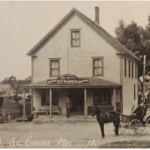China select board continues town meeting preparations
 by Mary Grow
by Mary Grow
CHINA, ME — China Select Board members continued town meeting preparations at their March 28 meeting, discussing at length three topics: asking voters to approve a moratorium on commercial solar development; the proposed 2022-23 municipal budget, with a focus on town employees’ pay; and 2022-23 expenditures of federal ARPA (American Rescue Plan Act) funds, which need voter approval.
At the annual town business meeting June 14, China voters will not act on a new ordinance to regulate commercial solar development, because planning board members have not finished writing it. (See related story here.)
Therefore, Town Manager Rebecca Hapgood said, she asked town attorney Amanda Meader about a moratorium on new solar projects, and Meader replied a moratorium would be a good way to protect town residents. The attorney was ready to draft the document if select board members approved the idea.
Three of them approved, outvoting the two who didn’t.
Wayne Chadwick objected immediately to “tying landowners’ hands for months because the planning board and the town didn’t do their job in a timely way.”
Blane Casey agreed. A landowner might lose his or her opportunity to lease property to a developer during the moratorium, he added.
From the audience, resident Brent Chesley said he thinks the draft ordinance really does need more work, for example, adding the requirement that a commercial solar developer provide money in advance to decommission and remove the installation at the end of its useful life.
He further reminded those present of resident Michael “Mickey” Wing’s testimony, during the March 22 public hearing on the draft ordinance, that the glass panels are considered hazardous waste until they’ve been sun-baked for 20 years. Wing, who runs the Waterville-based division of Casella Waste Systems, told the hearing audience that when a truck-load of panels got broken, the out-of-state supplier had to come and remove them, because the glass could not go to an in-state waste disposal facility.
Board chairman Ronald Breton agreed with Chadwick’s and Casey’s principle that people should be allowed to use their property as they wish, but he also agreed that Chesley had raised two issues needing attention to protect the town.
Breton, Jeanne Marquis and Janet Preston voted to have attorney Meader proceed with the moratorium draft. Casey and Chadwick voted no.
Hapgood expects that if the select board presents a moratorium to voters on June 14 and if voters approve it, it would apply only to commercial solar developments, not to panels for individual houses; and it would be effective for no more than 180 days from the March 28 action, unless the select board extended it.
Budget discussion briefly re-reviewed parts of proposed transfer station and public works expenditures, but the main argument, again resolved on a 3-2 vote, was over Breton’s proposal to add 1.5 percent to the previously-approved 3 percent wage increases for town employees.
Breton said the economy has changed since the early vote, and he has changed his position accordingly. He calculated if voters approve the additional pay, it would add $9,807 to the 2022-23 budget, not a major increase in an individual tax bill; and it would help employees pay higher living costs.
Casey started looking for other parts of the proposed budget that could be cut by a matching amount. Preston suggested using the $12,000 in the budget for select board members’ salaries; “none of us took this job for the pay,” she said. Hapgood expects increased revenues will cover the additional raises.
Casey and Chadwick again voted in the minority. Chadwick observed that taxpayers’ cost of living has gone up, too.
China has received $227,443.53 in ARPA money, Hapgood reported, and she expects a second payment in the same amount later in 2022. She presented a list of potential uses, some for the 2022-23 fiscal year and some for the following year.
After discussion, select board members approved recommending a total of $132,206 in expenditures for the June 14 ballot. The total might change, because Hapgood needs to confirm (or revise) at least one estimated cost.
Projects on the list as it stood at the end of the March 28 meeting are installing new generators at the town office and the old town house beside it; putting 911 numbers on every house; buying a digital sign to go in front of the South China fire station to provide town and fire department information; special payments to recognize employees who worked through the pandemic; a $5,000 fund for senior events; and a portable digital sign for speed control and for community announcements.
Hapgood said each expenditure would become a separate warrant article, so voters could approve or reject each one individually.
A new sign is proposed for only one of China’s three fire stations because only South China’s, on Route 32 South (Windsor Road), is on a state road, the manager explained.
The ARPA warrant articles were approved on a 4-1 vote with Casey dissenting.
Select board members briefly discussed other topics at the March 28 meeting.
They unanimously approved two revised schedules of transfer station user fees, one for residents of China and Palermo and one for users from all other towns. The new fees are effective April 1. All changes are increases, some more consequential than others.
For example, the cost of getting rid of king-size and queen-size box springs and mattresses doubles, from $5 to $10 each. The cost of disposing of a four-foot straight uncoated fluorescent bulb goes only from 12 cents a foot to 50 cents for the bulb. Twin and full-size mattress and springs charges and eight-foot fluorescent charges remain unchanged, at $5 and $1, respectively.
Casey reported on the recent Kennebec Regional Development Authority meeting at which he represented China. KRDA runs FirstPark, the business park in Oakland supported by central Maine municipalities.
There were “a lot of angry towns” represented, Casey said, because FirstPark hasn’t produced the revenue or jobs its promoters promised. However, he said, the message sounded positive: three lots are slated to become a solar farm (not a major source of jobs, he added); two or three other lots have potentially-interested buyers; and there was discussion of the possibility of selling the whole park to a private developer.
Select board members unanimously gave Hapgood authorization to seek bids on two mobile homes the town has acquired for unpaid taxes. They are located in a mobile home park on Chadwick Way, off Dirigo Road.
The manager said discussion of implementing the new trash-bag fees for Palermo residents continues.
Board member Preston said members of the China Broadband Committee (CBC), on which she represents the select board, plan a discussion with representatives of Direct Communications at the Wednesday, April 6, CBC meeting, scheduled for 4 p.m. in the former portable classroom behind the China town office. Direct Communications is the new owner of Unitel, the communications company serving Unity.
China select board members scheduled a special meeting for 6:30 p.m. Monday, April 4, to finish work on the warrant for the June 14 town business meeting. Their next regular meetings should be at 6:30 p.m. April 11 and April 25.
Responsible journalism is hard work!
It is also expensive!
If you enjoy reading The Town Line and the good news we bring you each week, would you consider a donation to help us continue the work we’re doing?
The Town Line is a 501(c)(3) nonprofit private foundation, and all donations are tax deductible under the Internal Revenue Service code.
To help, please visit our online donation page or mail a check payable to The Town Line, PO Box 89, South China, ME 04358. Your contribution is appreciated!





Leave a Reply
Want to join the discussion?Feel free to contribute!